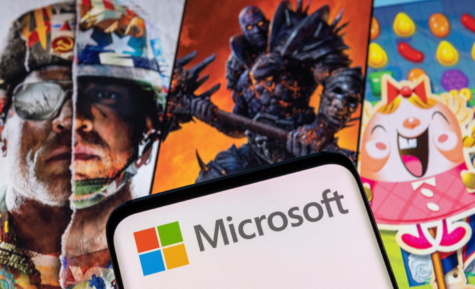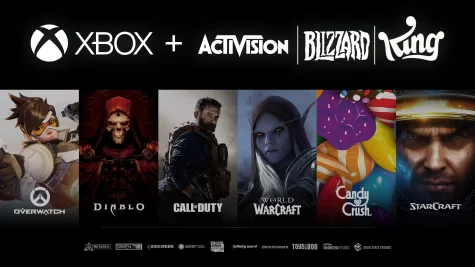
Austin Ashizawa | Student Life Editor
January 21, 2022
In a stunning event that rocked the gaming world, Microsoft has agreed to acquire Activision Blizzard for $68.7 billion. The purchase comes on the coattails of a massive lawsuit from the California Department of Fair Employment and Housing (DFEH) against Blizzard that included allegations from more than 2,600 current and former employees which detail disturbing cases of sexual harassment and racism. In September of 2021, the company settled for $18 million, and although the settlement is being appealed, over 40 Blizzard employees have left the company since last July.
Over the past year, Blizzard has collapsed like a house of cards, been doused in gasoline, and set ablaze. So why was Microsoft so intent on absorbing the studio? Simply put, it owns some very, very successful game franchises. Call of Duty? Owned by Blizzard, and in addition to the substantial player base, the game’s total earnings are estimated to be almost $9.7 billion. Overwatch? Also owned by Blizzard, the game has kept millions on their toes in anticipation of the long-awaited sequel, Overwatch 2. The games are famous (or in some cases infamous) for their ability to drive in hordes of money through tantalizing cosmetics and in-game purchases, but under this glistening surface lies issues that have persisted for years.
It’s been clear that Activision has started to lose their touch as they reuse the same, stale formula. Their most recent installment in the Call of Duty series, Vanguard, was only able to top about 40,000 copies sold in November of 2021 while Black Ops Cold War (released 2020) sold over 90,000 on debut. “Every year, they create a new campaign and throw a new mechanic in with some new maps and guns for the multiplayer and then release,” senior Max Silva said. “They expect players to blow money on the game before moving to the next one a year later, buying the game for full-price and starting the process all over again.”

Against their ever-expanding rival, Sony, Microsoft has been seeking every opportunity possible to elevate themselves. In recent years, this has been done through the acquisition of other studios, most notably with the purchase of Bethesda which produced such successful game franchises as Fallout and Skyrim. However, that deal came at $7.5 billion, making this recent purchase of Activision Blizzard the biggest endeavor the company has undertaken yet. If all goes well, the deal has the potential to revitalize Activision and push Microsoft into becoming the third-largest gaming company by revenue, behind Tencent (the parent company behind Riot Games and its IP League of Legends) and Sony (maker of Playstation). “Call of Duty is usually marketed with Playstation, providing exclusive content and driving sales,” Silva added. “This is now out of the question, and in essence, Microsoft is stealing a huge market from their competitors.”
“With the success of Halo Infinite, there’s really no telling how Microsoft will take charge of these big titles,” junior Christopher Royer said. “But there has to be a plan for these titles owing to the sheer amount of money in the contract.” With a large audience of over 25 million Xbox game pass subscribers, the deal has the potential to be an amazing redemption as a corrupt and dying corporation is raised from the garbage and lifted into a new golden age, but it could also be a scenario like what we have seen time and time again with imposing parent companies. For one of the most infamous examples of acquisition gone wrong, look no further than Electronic Arts. They managed to acquire the Star Wars license and yet over the past couple of years, they seemed to have thrown the opportunity by the wayside.
A lot of news about the situation is still unfolding, and only time will tell how well the transition is handled. According to the Wall Street Journal’s sources, Microsoft confirmed that the current CEO of Blizzard, Bobby Kotick, will remain for the next couple of months until he is replaced by the current CEO of Microsoft gaming, who will oversee the studio personally. With piles upon piles of allegations against Kotick, it seems that this could be a step in the right direction towards a better and brighter future inside of Activision Blizzard. And overall, “whether it was the people they hired or the conditions of the workspace there must be change on a basic game company work environment,” Royer added. “But if Blizzard adopts the same policies as Microsoft in keeping a social and professional work environment, things should run much more smoothly.”
“I know that Microsoft is going to continue their spending spree as they keep expanding Game Pass,” Silva said. “But with Spencer in charge and the team left to develop, I feel the environment will improve and prove even more productive with Xbox in charge.” And despite the obvious shifting of influence scales in the gaming market following this event, Spencer has announced that Xbox still plans to continue releasing Activision games for the entire industry—not just Xbox. The future looks bright for the videogame industry as we wait for Microsoft to fully take the reigns in mid-2023. And who knows? It may even be the savior of so many long-forgotten gaming properties.

Leave a Reply